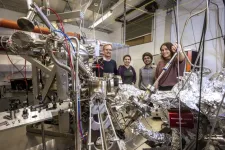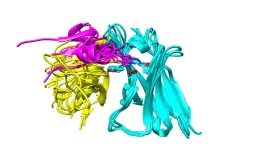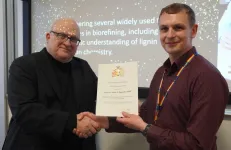(Press-News.org) First ever study looking at disease risks of wild meat activities in rural communities.
Nearly 70% of rural respondents at Kenya-Tanzania border said that COVID-19 did not impact their levels of wild meat consumption, with some even reporting increased consumption.
Ungulates were found to be the most consumed species, followed by birds, rodents and shrews.
Governments need to focus on better controlling zoonotic disease transmission risks through community engagements on behavior change interventions, improving hygiene and standards of informal markets, supporting wildlife conservation efforts and providing communities with alternative protein sources.
NAIROBI, Kenya (06-04-2023) – That many pandemics, including possibly COVID-19, have had their origins in wild animals might be expected to cause meat consumers to reduce their consumption of risky ‘bushmeats’, which are derived from wild animals, to avoid illness. But a new study of bushmeat eaters at the Kenya-Tanzania border tells a different story.
While most people in these rural communities were aware of the dangers posed by bushmeat, they continued to consume it anyway. Some even increased their consumption due to the economic constraints imposed by COVID-19 measures.
The study explored the impact of COVID-19 patterns on wild meat consumption and perceptions of associated zoonotic disease risks. This is the first ever study to look at disease risks associated with wild meat value chains in rural settlements. It was undertaken by a team of researchers from the International Livestock Research Institute (ILRI), the Center for International Forestry Research and World Agroforestry (CIFOR-ICRAF), the global wildlife trade monitoring network TRAFFIC, Nature Heritage and the Wildlife Research Training Institute.
‘Wildmeat trade and consumption in sub-Saharan Africa are both widespread and complex; we need to better understand the rural and urban demand for wild meat, particularly as the meat of some bird, rodent and other species is particularly risky to consume’, says ILRI scientist Ekta Patel.
The study, conducted in December 2021, interviewed 299 people in communities on the Kenya-Tanzania border. Key findings revealed that levels of education played a critical role in understanding zoonotic disease transmission. Respondents with higher levels of education were more aware of the risks of disease transmission. Nearly 80% of respondents learned about COVID-19 from mass media sources.
Zoonotic diseases are those that originate in animals—be they tamed or wild—that then mutate and ‘spill-over’ into human populations. Two-thirds of infectious diseases, from HIV/AIDS, which originated in chimpanzee populations in early 20th century Central Africa, to COVID-19, which is believed to have originated from an as-yet undetermined animal in 2019, originate in animals.
Despite understanding the associated risks of consuming meat from wild animals, the study found that COVID-19 did not strongly affect the consumption of wild meat, with only 30% of respondents reporting lower consumption because of the pandemic. Nearly 70% said that COVID-19 did not impact their levels of wild meat consumption, with some even reporting increased consumption. Researchers attribute this to the increased food costs caused by regulations to control the COVID-19 pandemic, which made many people seek protein sources cheaper than beef, mutton, chicken and other domesticated animal meats.
‘While hunting wild animals for their meat has been a crucial activity in the evolution of humans and continues to be an essential source of food and income for millions of indigenous and rural communities globally, wildlife conservationists rightly fear that excessive hunting of many wild species will cause their demise. To ensure continued use of wildlife resources by those who depend on it, sustainable hunting, marketing and consumption practices must be implemented. Local communities need to remain or become custodians of the wildlife resources within their lands, for their own well-being as well as for biodiversity in general’, says Julia Fa, University of Manchester professor and fellow at CIFOR-ICRAF.
The study also examined local perceptions of risks associated with wild meat consumption, where respondents recognized the risk of other disease transmissions, including anthrax and brucellosis. The study’s respondents also recognized that high disease risk was associated with people with open wounds slaughtering wild animals and handling wild meat. Moreover, respondents identified meat from wild animals as more dangerous than meat from domesticated livestock, with hyena meat consumption cited as the riskiest. Ungulates were found to be the most consumed species, followed by birds, rodents and shrews.
‘While scientific evidence has shown that spotted hyenas are reservoirs of coronaviruses, we don’t know why these local communities thought hyenas to be risky edible species; more needs to be done to understand community perceptions about what is and isn’t a risky species to hunt and consume as well as address potential risks associated with consumption of birds and rodents’, says Patel.
Interestingly, community members differed in their responses. While more than 80% of the study’s respondents living in Kenya believed that wild meat should not be sold due to concerns for wildlife conservation, less than half the respondents in Tanzania felt the same, perhaps reflecting Kenya’s more stringent wildlife use regulations. Gender differences were also observed, with men more concerned than women about getting COVID-19 from live animals. (It is, in fact, difficult to get COVID-19 directly from contact with animals, even from animals infected with the disease pathogens, since animals tend to suffer from species-specific mutations of the virus. But other zoonotic risks remain such as anthrax.)
This study highlights the need to understand better how local communities perceive zoonotic and other disease risks associated with wild meat hunting, selling and consumption, especially in light of the COVID-19 pandemic. The findings can be used to inform public health strategies targeted at community inclusion and disease behavioral campaigns, particularly in lower-income countries where wild meat trade and consumption remain prevalent.
Safe as well as sustainable wild meat consumption can be advanced in several ways, such as:
(1) by providing communities with greater access to affordable meat from domesticated livestock
(2) by giving local communities incentives to change any risky behaviours that may lead to spillover of pathogens from animals to humans
(3) by supporting food sellers in the informal markets of the poor to adopt greater hygiene and related food safety standards
(4) by finding new ways to meet the nutritional needs of the poor, for whom wild meat remains an important source of proteins and micronutrients.
(5) by regulating wildlife hunting and sales of wild animals and their meat for conservation
END
Bushmeat consumption unchanged by COVID-19 in Kenya and Tanzania border towns, new study reveals
2023-04-06
ELSE PRESS RELEASES FROM THIS DATE:
Methyl groups enhance key properties of PHA plastics and enable closed-loop recyclability
2023-04-06
A class of polyesters considered a promising alternative to common plastics, were it not for limitations like brittleness and thermal instability, have now been made more mechanically tough and thermally stable. Researchers replaced the reactive hydrogens in the monomer of these materials – polyhydroxyalkanoate (PHA) plastics – and found it enhanced PHA thermal and mechanical properties and enabled closed-loop chemical recyclability. The new approach could provide a route for increased use of sustainable PHA plastics. ...
Ultra-fast light at the end of the vacuum tunnel: Meta-optics shows physical processes in the attosecond range
2023-04-06
Developed at Harvard, and successfully tested at Graz University of Technology (TU Graz), a revolutionary new meta-optics for microscopes with extremely high spatial and temporal resolution has proven its functional ability in laboratory tests at the Institute of Experimental Physics at TU Graz. Microscopes using this kind of lens promise completely new research and development approaches, especially in semiconductor and solar cell technology. The research team from Graz and Boston currently reports on the construction and the successful laboratory experiment with this new meta-optics in the specialist journal Science.
The lens of ...
New atomic-scale understanding of catalysis could unlock massive energy savings
2023-04-06
MADISON – In an advance they consider a breakthrough in computational chemistry research, University of Wisconsin–Madison chemical engineers have developed model of how catalytic reactions work at the atomic scale. This understanding could allow engineers and chemists to develop more efficient catalysts and tune industrial processes — potentially with enormous energy savings, given that 90% of the products we encounter in our lives are produced, at least partially, via catalysis.
Catalyst materials accelerate chemical reactions without undergoing changes themselves. ...
Researchers reveal why viruses like SARS-CoV-2 can reinfect hosts, evade the immune response
2023-04-06
The human body is capable of creating a vast, diverse repertoire of antibodies—the Y-shaped sniffer dogs of the immune system that can find and flag foreign invaders. Despite our ability to create a range of antibodies to target viruses, humans create antibodies that target the same viral regions again and again, according to a new study led by investigators from Brigham and Women’s Hospital, a founding member of the Mass General Brigham healthcare system, and Harvard Medical School. These “public epitopes” mean that the generation ...
UH study finds Black Lives Matter movement had significant impact on Black entrepreneurs’ crowdfunding efforts
2023-04-06
New research conducted by the University of Houston Conrad N. Hilton College of Global Hospitality Leadership suggests the Black Lives Matter movement had a significant, positive impact on the fundraising efforts of Black restaurateurs.
In a study published in the International Journal of Hospitality Management, the researchers found in the decade before Black Lives Matter rose to prominence, Black restaurateurs were 76% less likely to be successful in the use of crowdfunding sources, such as Kickstarter, than non-Black restaurateurs. From 2010 – 2015, funding was 72% lower for Black-owned businesses and from 2016-2020 it was 79% lower.
But that all changed ...
Aston University hosts Royal Society of Chemistry prize-giving
2023-04-06
Professor Arthur Ragauskas awarded Royal Society of Chemistry prize
He is based at the Oak Ridge National Laboratory and University of Tennessee
He chose to receive award at Aston University because of its research into renewable resources.
Aston University has hosted a prestigious Royal Society of Chemistry prize-giving and lecture.
Professor Arthur Ragauskas of the Oak Ridge National Laboratory and University of Tennessee chose the University as the venue for this event because its research into renewable resources has inspired his work.
He is the recipient of the Society’s 2022 environment, sustainability and energy division open award: Environment ...
New professor to boost Aston University’s photonics expertise
2023-04-06
Professor Richard Hogg will be joining Aston Institute of Photonics Technologies
It is a leading photonics research centre, with a successful track record of scientific achievements
Professor Hogg will be focusing on research and commercialisation.
Aston University is to welcome Professor Richard Hogg who will be joining its flagship photonics research institute
He will be focusing on research and commercialisation at Aston Institute for Photonic Technologies, Aston University’s Aston Institute of Photonics Technologies (AIPT) a leading photonics research institute with a successful track record of ...
NASA, Webb Telescope industry team awarded Collier Trophy
2023-04-06
NASA and the James Webb Space Telescope industry team, led by Northrop Grumman Corporation, have won the prestigious National Aeronautic Association (NAA) Robert J. Collier Trophy for revolutionizing the field of astrophysics with the team’s pioneering design and exceptional performance of the telescope. The Collier Trophy is awarded annually for “the greatest achievement in aerospace and astronautics in America.” The award will be presented at the NAA Gala in Washington, D.C., on June 15.
“The James Webb Space ...
Paris will host the 6th World Congress on Targeting Phage Therapy 2023 next June with more than 51 scientific communications from 27 different countries
2023-04-06
More than 125 international academics and industrials from 27 different countries will be joining Targeting Phage Therapy 2023 on June 1-2 in Paris. During Targeting Phage Therapy 2023, 50+ communications will be presented in the form of major talks, short orals, and posters.
Among the speakers
Targeting Phages 2023 will address how phages play a strategic role to combat infection and antibiotic resistance, but also to modulate gut microbiota. Phage enthusiasts and experts will be presenting their latest data and innovations.
Domenico Frezza, University of Roma Tor Vergata, Italy
“Phage Therapy: Vision, Gaps and Evolution”
Martha Clokie, ...
Sierra squirrels find their niche amid a changing climate
2023-04-06
As the climate changes, many species are expected to adjust where and how they live. Some are expected to seek cooler elevations as it warms, but what happens to species already at the top of a mountain? A study of squirrels living in California’s high-elevation Sierra Nevada indicates that climate is only one factor to consider when trying to predict where an animal will make its home in a changing world.
The study, led by the University of California, Davis, is published in the journal Ecology and Evolution and was conducted in alpine regions stretching ...







